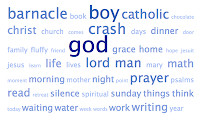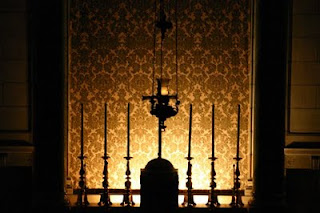
The picture is Ruben's St. Cecilia...the saints in the list? my choice!
This column appeared in the Catholic Standard & Times on 3 December 2009.
For ourselves, too, we ask some share in the fellowship of your apostles and martyrs, with John the Baptist, Stephen, Matthias, Ignatius, Augustine, Monica, Felicity, Perpetua and all the saints.
— From the Roman Canon“Whoa, what is this?” wonders one of the teen-aged invaders in my study. Invited into my
sanctum sanctorum to hunt through my yarn collection for a Christmas project, they were enjoying checking out what other treasures I kept hidden from them up here. Family photos are strung across one wall, outlines of essays are scratched on the blackboard and, sharing a shelf with the Mathematical Tables for the Handbook of Chemistry and Physics, is the 100-year-old, worn leather bound volume that had caught Lindsay’s eye: Breviarum Romanum. The Latin version of the Divine Office — the Liturgy of the Hours.
I opened it to the page for the day: 22 Nov. — Sanctae Caecilae was written in red across the top. For the feast of St. Cecilia I explained to my (non-Catholic) visitor, “There are prayers for every day of the year, for different hours of the day, for the saints and for their feasts.” Her first impression? “That’s intense.” I certainly find it intense, but not quite in the same way.
The modern version of the Hours offers us “some share in the fellowship of [the] apostles and martyrs” as we ask in Eucharistic Prayer I. The Office of Readings, which opens with a triad of psalms, sets out a feast of readings drawn both from Sacred Scripture and from the depths of the Church’s archives. Letters from saints, accounts of their lives, homilies by priests and popes, excerpts from the documents of Church councils, a rich chorus of voices from the first century through to the last can be heard.
The saints have ceased in my mind to be stone statues tucked into alcoves or images — albeit colorful ones — caught in the glass of church windows. Instead, Thomas More springs off the page as he writes to his daughter from prison of his struggles to keep on the path God has set him upon, “I will not mistrust him, Meg…”
I feel a sudden kinship with St. Jerome when I hear him bring a bit of physics into his reflections on the interpretation of Scripture, “it was not the air vibrating with the human voice that reached their ears, but rather it was God…” Like the family stories that breathe life into the ragged black and white photos of relatives you never met, the Liturgy of the Hours keeps these saints alive.
On days when I can’t find a second to spare in my day for the Office of Readings, the structure of the Hours still let me peek through a window into the lives of the saints. Ernest Hemingway once wrote, perhaps in jest, that his best story was written in six words: “For sale: baby shoes, never worn.”
The prayers proper to each saint, that close morning and evening prayer, have a brevity of narrative that Hemingway would appreciate. “God our Father, you called St. Bruno to serve you in a life of solitude…” begins the prayer for the founder of the reclusive Carthusian order. St. Jane Frances de Chantal, I learn, is “renowned for her outstanding merits in two different walks of life” — she was both wife and nun. Like Hemingway’s tantalizing piece of prose, these prayers give me something small enough to hold onto during a busy day, but intriguing enough to feed my contemplations.
When my family gathers, we tell our stories — the long one of my parents’ courtship, the ones that with a mere six words can make us laugh until we cry: “Remember John and the turkey leg?” And when I gather with the Church family, I cherish those stories even more — most of all the one-liners.
God, the rock of our salvation, whose gifts can never fail, deepen the faith you have already bestowed and let its power be seen in your servants. We make our prayer through our Lord Jesus Christ, your Son, who lives and reigns with you in the unity of the Holy Spirit, God for ever and ever. Amen
 Last year at this time I was packing up to leave for the Spiritual Exercises. This year I'm lazing on the sofa recovering from a nasty bug. Unable to muster much energy to review the year at this point, I tossed all my posts for 2009 and for 2008 into a tagcloud app, wondering if an objective view from 10,000 feet might be revealing. Are the words I use any different post the Exercises? The topics I'm writing about?
Last year at this time I was packing up to leave for the Spiritual Exercises. This year I'm lazing on the sofa recovering from a nasty bug. Unable to muster much energy to review the year at this point, I tossed all my posts for 2009 and for 2008 into a tagcloud app, wondering if an objective view from 10,000 feet might be revealing. Are the words I use any different post the Exercises? The topics I'm writing about? ome night?; and I'm contemplative rather than waiting. And the exercises clearly have made a mark...
ome night?; and I'm contemplative rather than waiting. And the exercises clearly have made a mark...

























